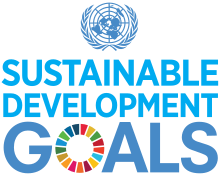
Back Volhoubare Ontwikkelingsdoelwitte AF ለዘለቄታዊ የልማት ግብ AM أهداف التنمية المستدامة Arabic اهداف التنميه المستدامه ARZ বহনক্ষম উন্নয়নৰ লক্ষ্য AS Dayanıqlı İnkişaf Məqsədləri AZ Tatujon Pawangunan Malanturan BAN Мэты ўстойлівага развіцця BE Цели за устойчиво развитие Bulgarian सस्टेनेबल डेवलपमेंट गोल BH
| Sustainable Development Goals (SDGs) | |
|---|---|
 | |
| Mission statement | "A shared blueprint for peace and prosperity for people and the planet, now and into the future" |
| Location | Global |
| Founder | United Nations |
| Established | 2015 |
| Disestablished | 2030 |
| Website | www |
The Sustainable Development Goals (SDGs) are a collection of 17 global objectives established by the United Nations in 2015 as part of the 2030 Agenda for Sustainable Development. These goals aim to address a broad range of interconnected global challenges, including poverty eradication, environmental sustainability, social equity, and economic growth, under the guiding principle of "leaving no one behind." Designed to replace the Millennium Development Goals, the SDGs apply universally to all countries, irrespective of their development status, and seek to promote peace, prosperity, and the health of the planet.
Each goal is further divided into specific targets—totaling 169—and measured by 232 unique indicators to track progress. Key goals include ending poverty (SDG 1), achieving gender equality (SDG 5), combating climate change (SDG 13), and fostering global partnerships (SDG 17). However, progress has been uneven and faces significant obstacles, such as rising inequality, climate change, biodiversity loss, and the impact of the COVID-19 pandemic.
The SDGs emphasize the indivisibility of sustainable development's social, economic, and environmental dimensions, advocating for inclusive policies and practices at global, national, and local levels. Despite their non-binding nature, the SDGs have influenced global debates, policy agendas, and institutional priorities, though transformative change remains limited. Collaborative financing, technological innovation, and a strengthened global partnership are critical for achieving these ambitious goals by 2030.